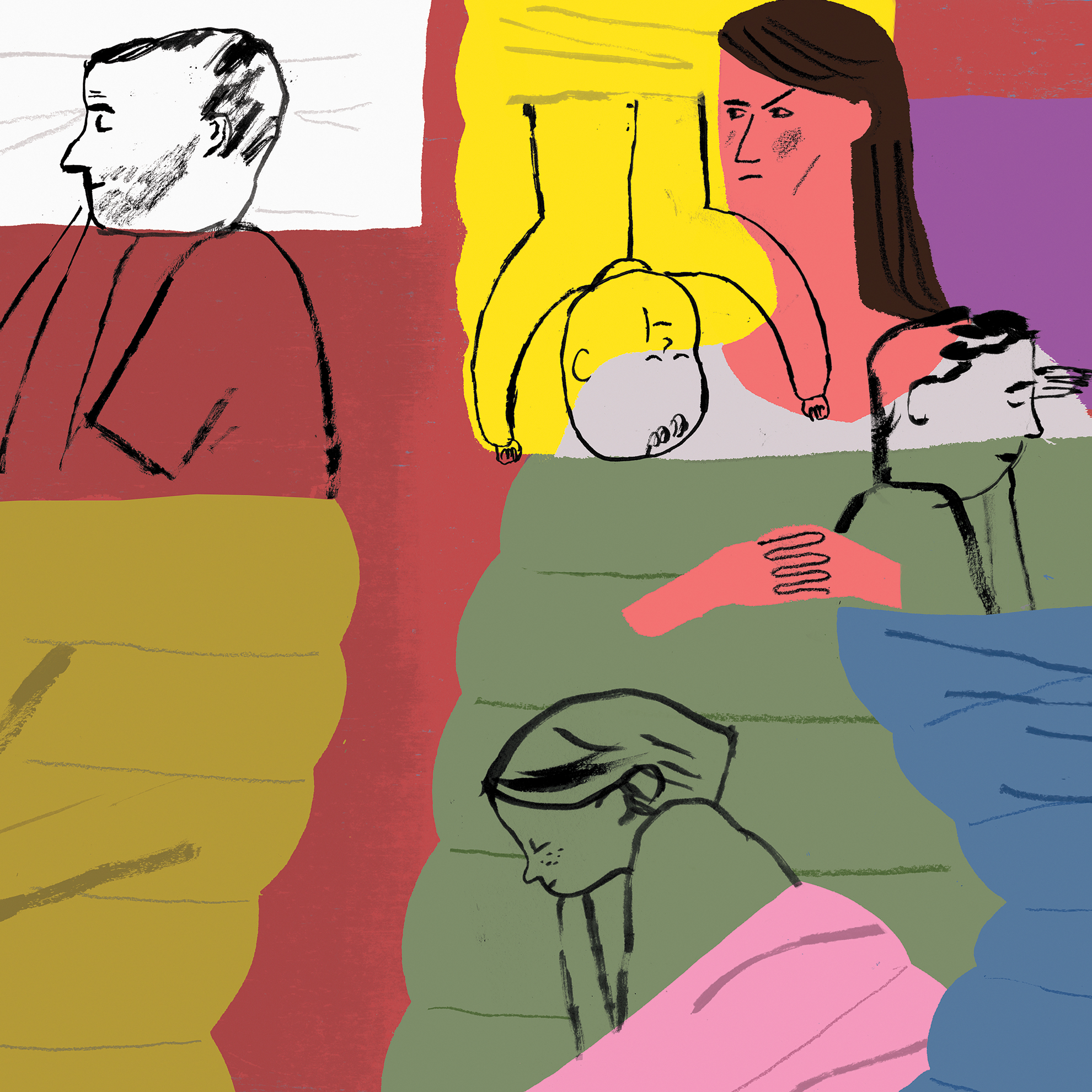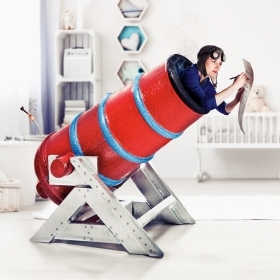In which a mom stops trying to be a perfect, rugged outdoorswoman and embraces the comfort-loving, wildlife-fearing person she is—with champagne and chocolate in hand.
For the first 15 years of our relationship, my husband and I lived in a blissful, camping-free state. Any references to time outdoors implied the return to food, shelter, and all interior comforts by...

For the first 15 years of our relationship, my husband and I lived in a blissful, camping-free state. Any references to time outdoors implied the return to food, shelter, and all interior comforts by nightfall. Sure, he would occasionally wax poetic about the tent camper his parents would hook up to their station wagon every summer for impromptu trips along the California coastline, but these stories seemed as mystifying to me as the ones he told about being able to enjoy surfing before school, or lying out in the grass most afternoons talking with his brothers until the sun went down. When I was in high school just outside Boston, it was still dark outside when I trudged to school, and even if I got to bed before midnight after the jam-packed schedule I felt compelled to design, I’d still lie in bed for another hour waiting for my feet to get warm.
So despite the fact that my husband occasionally daydreamed aloud about the camping trips we would take when our children were old enough, I never really believed he would follow through. Maybe it was wishful thinking; maybe it was selective hearing. But whatever the nature of my denial might have been, I was blindsided when, after the aforementioned 15 years of camping-free life, my husband casually informed me that he had booked the whole family for a camping trip.
“Wait,” I said, “you mean, like, real camping?” I tried to take my voice out of the realm of hysteria. “On the ground?” I went on. “In tents? With all of us?” Our youngest son was still in diapers, and our eldest still refused to eat anything that wasn’t definitively beige. And our daughter had managed to get lost in her own room just that week. “Don’t worry!” he exclaimed, matching my panicky questions with falsely amped-up cheer. “You’ll love it! I’ll take care of everything!” As if the whole camping thing hadn’t been unbelievable enough.
But then the gear started arriving in the mail. And he started teaching the kids how to put up the tent and pack their sleeping bags. He even ordered food. Lots of it. Way ahead of time. The garage started to look like it was inhabited by some freakish offspring of Grizzly Adams and Martha Stewart. True to his word, my husband—the same husband who frequently could not find the milk in the fridge even if he was looking directly at it—was taking care of everything. And instead of bringing me comfort, it only heightened the growing sense that the world was turning inside out. I cheered him on during the day and summoned my best attitude, but I lay awake at night trying to figure out how we were going to change diapers in the woods, or what kind of coffee situation my caffeine-dependent, mommy-of-three system might have to face, or what the bear warnings on all California camping materials implied about a human’s odds in an obviously ursine-dominant environment.
“Jews don’t camp,” I tried in an increasingly desperate attempt to avoid the inevitable. “We spent 40 years in the desert. We see no reason to go back outside.” For some reason (OK, he was raised by a German Catholic mother and an English Protestant father), he thought I was just joking. “Maybe you can just go with the kids,” I offered. “Have you ever heard of glamping?” I chirped, flushed and red-eyed from staring for hours on end into the furthest reaches of the internet for solutions that might work for both of us. The edges of his cheer began to fray.
So I girded myself, emotionally speaking. I told myself it wouldn’t be that bad. I told myself that part of why I loved living in California was that it was so endlessly beautiful out-of-doors. I reminded myself of how the balance of power had shifted in our relationship since the kids were born, how I had a tendency to shoulder him out of our home life, and he had a tendency to obsess over work. I was, I finally realized, in the midst of one of those marital situations in which a good attitude was non-negotiable.
So we went camping.

And oh, how I wish I could say that none of my fears were realized. Or that I suddenly found within me the ability to become the camper we all so desperately wanted me to be. I tried very hard to ignore the fact that the bathrooms smelled like stables and were flooded with a dark water of unmentionable origin, but I fear that my white face and goose-stepping betrayed my true feelings. I tried to eat the meals prepared with Foods That Do Not Perish, but my usually voracious appetite was noticeably absent. And my poor, long-suffering husband did his best to protect me from the sounds of the spontaneous air hockey tournament that arose in the wee hours of the morning at the teen site next to ours, but alas, I have ears. I almost ran away with the Indian family who somehow managed to make warm chai tea on a camp stove the next morning. (I will never forget you, Patels. You are forever in my heart.)
I also wish that these initial disturbances were an anomaly. But in the five years since that first, ill-fated weekend, I have learned that most California campsites are set up like bus stations, with less than 10 feet between tents and an average ratio of about one restroom for every 30 people. And that campers like to drink until long after the sun sets and such drinking leads to boisterous interpersonal interactions of every possible kind.
Also, while my husband does take care of everything, much to my gratified and admittedly astonished delight, we have slightly different understandings of what makes a successful camping trip. For example, he is usually peacefully slumbering when the magnet that mysteriously draws the kids to sleep directly on top of me effects its inexorable pull; he firmly believes that if the supermarket packages a food and sells it at a cheap price, it’s worth ingesting; and even he cannot find the good in showers that make you dirtier than when you first started. In fact, at his best, he ignores all camping-related inconveniences very well, thus insuring that he and the kids usually have a marvelous time. And I will say that at least the smells and noise and squalor keep away the bears. (Except for that one weekend in Yosemite, when I stepped outside our tent in the morning to a bear nosing her way through some unprotected garbage a few yards behind my blithely oblivious husband.)
So camping was everything I feared it would be—or rather, my experience of camping was everything I feared it would be. And at first, I spent a lot of time wondering how I might change my perceptions and become the cheerful camper I wanted so badly to be: the team player, the rugged and fun-loving outdoorswoman, the mom who is happy as long as her kids are happy. I even tried these qualities on for size, but the fit was noticeably poor and I wound up tripping all over them.
But then one day, while stopping for groceries on the way toward one of those campsites deep within a dark, damp wood beside a river our poorly swimming children would no doubt leap into, I impulsively grabbed a bottle of champagne, and added the latest issue of People. Something kicked alive within me, and before I knew it I was also checking out a salad and some good, dark chocolate, right along with the diapers and Wonder Bread and hot dogs.
As soon as we arrived and unpacked, I settled into a picnic table with my unconventional but sorely appreciated treats. And you know what? That camping trip wasn’t quite so bad. I was onto something.

The trick was—as it so frequently is—to stop fighting against myself. To stop trying to make myself into the kind of camper my husband is, or my kids are. To stop envying their ease around seemingly minor roadblocks, and appreciate that even though I cannot also make light of the lice infestation at the campsite or midnight divorce proceedings in the tent next door, my sensitivities allow me to be the emotionally devoted and attentive mother that I am. Sometimes I believe that the best gift I can give my children is to model how to graciously accept my own most distinctive qualities in all their variegated glory, even though some of these qualities make me less popular and less portable. After all, don’t we owe the ones we love our best selves even when the wolves are howling and the toilets are clogged?
So after that first summer, I gently explained to my husband that while he was welcome to continue booking several camping weekends a summer, he would have to accept that I’d only promise to attend one. Now, although my kids enjoy teasing me about the germs and food, they also bring me blankets and hot cocoa when I am brave enough to stay out by the campfire long after the mosquitoes begin biting and well before the raucous singing winds up. I have also gradually earned their camping respect by being able to pack the sleeping bags into their impossibly tiny containers (motivation is an amazing thing), the only one in the family who will eat the charcoal-encrusted marshmallows they “accidentally” (gleefully) drop into the fire, and a pretty fearless, if somewhat inept, boogie boarder. So although I’ll never become the sort of enthusiastic outdoorswoman I so admire, camping has set me on a new path, one in which I allow light to shine on my flaws and quirks. And when I’m walking that path, even if it’s infested and dusty and crowded, I find myself breathing a little more freely.
 Liza Wachman Percer ’96 is the author of two novels, An Uncommon Education (HarperCollins, 2012) and All Stories Are Love Stories (HarperCollins, 2016). She lives in Northern California with her husband and three children.
Liza Wachman Percer ’96 is the author of two novels, An Uncommon Education (HarperCollins, 2012) and All Stories Are Love Stories (HarperCollins, 2016). She lives in Northern California with her husband and three children.

